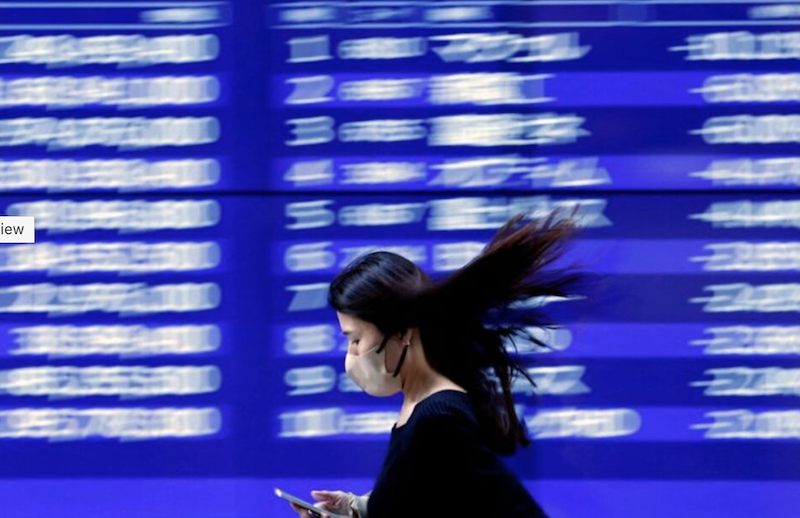Japan’s Nikkei share average reached an eight-month peak on Monday as the country’s central bank’s determination to stick with its easy policy stance kept the yen weak, boosting exporter fortunes.
It was a day of thin trading across the region with the vast majority of markets closed for the May Day holiday and Sydney the only other major market open for trading.
Tokyo’s benchmark index edged up 0.92%, or 266.74 points, to close at 29,123.18, while the broader Topix was ahead 1.00%, or 20.58 points, to 2,078.06.
Also on AF: Indian Factory Activity Rises to 4-Month Peak in April
Rail and airlines were the best performing of the Tokyo Stock Exchange’s 33 industry sectors on the potential boon for tourism, while exporters including automakers rose amid the boost to the value of overseas sales.
Tech services provider surged 14% after strong earnings to be the best performing Nikkei stock by a wide margin. Sony Group was a standout decliner, dropping 4.17% after forecasting profit to slip from a record high.
The yen weakened to as low as 136.87 per dollar in Tokyo, extending its decline from Friday, when the BoJ kept stimulus settings unchanged and signalled it was in no hurry to normalise policy.
Japan has a shortened trading week, marking the Golden Week holiday from Wednesday, when the US Federal Reserve sets policy, followed by the European Central Bank on Thursday.
Financial stocks also did well, shaking off news of the likely failure of US bank First Republic. The bank index gained 0.92% and the securities index advanced 0.72%.
The traditional Labour Day holidays around the globe likely limited initial market reactions to a delay in an expected decision by US regulators on what to do with troubled First Republic Bank.
San Francisco-based First Republic has struggled since the collapses of Silicon Valley Bank and Signature Bank in early March, as investors and depositors fret that the bank may not survive as an independent entity for much longer.
First Republic has been seen as the most likely next bank to collapse due to its high amount of uninsured deposits and exposure to low interest rates. Regulators were thought to be seeking to sell all or part of the bank before markets reopened for trading Monday.
The bank’s stock closed at $3.51 on Friday, a fraction of the roughly $170 a share it traded for a year ago.
Elsewhere across the region, the S&P/ASX 200 in Sydney advanced 0.5% to 7,344.20.
Fed Rate Hike Fears Rise
On Friday, the S&P 500 gained 0.8% to 4,169.48. Despite some sharp swings over the week, it still clinched a second straight winning month. The Dow Jones Industrial Average climbed 0.8% to 34,098.16, and the Nasdaq composite gained 0.7% to 12,226.58.
Based on recent economic reports, traders are betting the Federal Reserve will raise interest rates again at a meeting next week and possibly again in June.
A report on Friday said the inflation measure that the Fed prefers to use came in close to expectations for March, but is well above the target. Also, wages rose more during the first three months of the year than economists expected, potentially keeping inflation more entrenched.
The Fed has raised its key overnight interest rate to its highest level since 2007, up from its record low, following a barrage of hikes since early last year. Together, they’ve already slowed the economy’s growth down to an estimated 1.1% annual rate at the start of this year. They’ve also caused cracks in the banking system.
In other trading on Monday, US benchmark crude oil gave up 75 cents to $76.06 per barrel in electronic trading on the New York Mercantile Exchange. It gained $2.02 on Friday.
Brent crude, the standard for pricing for international trading, shed 65 cents to $79.68 per barrel.
The US dollar rose to 136.92 Japanese yen from 136.24 yen. The euro weakened to $1.1002 from $1.0023.
Key figures
Tokyo – Nikkei 225 > UP 0.92% at 29,123.18 (close)
Hong Kong – Hang Seng Index <> CLOSED
Shanghai – Composite <> CLOSED
London – FTSE 100 <> CLOSED
New York – Dow > UP 0.80% at 34,098.16 (Friday close)
- Reuters with additional editing by Sean O’Meara
Read more:
Australia Set for Big Budget Rebound, But Tax Cuts Cloud Outlook
China’s Moves to Boost Use of The Yuan Starting to Pay Off
























